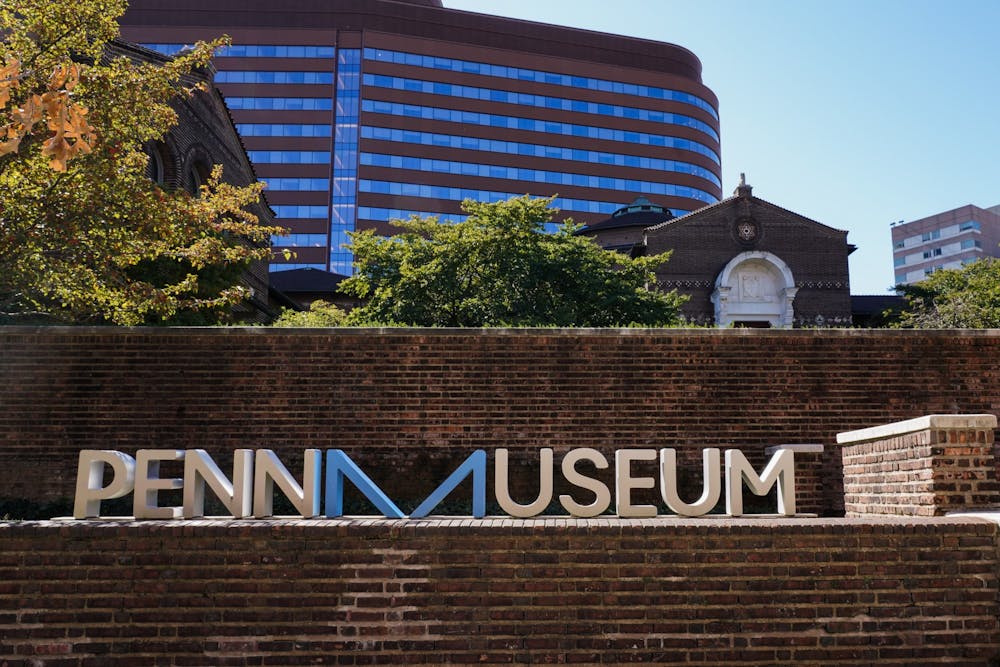Penn Museum hosted the first event of a three-part series exploring Lenape history on University land and the surrounding area this Saturday.
Eighth-year Penn anthropology Ph.D. candidate Justin Reamer gave the lecture — “The Archeology of Lenapehoking: 12,000 years of Lenape” — to around fifty attendees. Using unearthed artifacts such as arrowheads, bowls, net sinkers, and jewelry to illustrate major shifts in Lenape lifestyle, he walked audience members through the major archeological periods.
At the lecture, Reamer also discussed some of his own research, which he said focuses on the Lenape's path from being hunter-gatherers to maize farmers. He described his lecture as “a 12,000-year overview in the course of an hour,” which is intended as a foundation for two more events this year: a visit to Abbott Farm National Historic Landmark, a major archeological site, on Nov. 5, and a discussion with Lenape leaders on March 15.
Reamer said that he decided to give his talk in order to raise awareness of Lenape history, especially since the relationship between tribes and the University is essentially limited to gravesite repatriations, which he deemed a “business relationship.”
According to Reamer, people tend to waver between ignoring and myth-telling when it comes to uncomfortable truths on the subject.
“[The Penn Museum] just does not do a good job of addressing the history of the Lenape. There’s like a plaque when you walk in acknowledging that we are on Lenape land,” he said.
Reamer said that the narrative that the Lenape willingly and knowingly “signed the deed over to William Penn” is highly misleading, based on “differing conceptions of how land can be owned.” He hopes that the future will hold more “working with Lenape groups to tell their history in the way they would.”
Reamer gave the lecture at the request of his faculty advisor, associate professor of anthropology Meg Kassabaum, who described him as “one of the experts in this area right now." Museum programming on Lenape history and archeology was originally discussed with Penn’s Wolf Humanities Forum, according to Tena Thomason, the museum’s Associate Director of Public Engagement.
RELATED:
Maya activists to speak about Indigenous rights at the Perry World House on Oct. 11
Following ARCH renovation plans, 7B group leaders share semester plans, long-term vision
Professor Kassabaum said that she sees Lenapehoking — the Lenape name for the land Penn and its surrounding area occupy — taking on a bigger presence. Where many archeological and anthropological opportunities are based in Mississippi, Egypt, or Turkey, Kassabaum said that “allowing some of those programs that we already run to focus on Lenapehoking … would be the next step.”
Many audience members said that they felt that the history of the Lenape was important to discuss and acknowledge, especially since it is the land they are living on. Reamer attributed part of the interest in the event to a recent "major repatriation of Lenape ancestral remains and objects."
He also pointed out that a number of places in Philadelphia carry Lenape names: Passyunk Avenue, Wissahickon Valley Park, Manayunk Neighborhood — not to mention New York’s island of Manhattan.
Penn’s recognition of Indigenous Peoples’ Day and Lenape land has long been the subject of controversy. The past two years, students have marched to demand greater recognition of the holiday.
In 2020, they asked that it be added to the Secular & Religious Holidays list posted on The Office of Chaplain & The Spiritual and Religious Life Center calendar, and in 2021 they called for it to be added to the University Academic Calendar. For the 2022-23 academic year, it was on the calendar, although classes were in session.
Additionally, the student group Natives at Penn has long hoped to secure a space in the ARCH building and will be relocated to the building in light of its new expansion. NAP continues to fight for more space, as the organization is currently only recognized as a student group rather than a cultural resource center.
Natives at Penn did not respond to a request for comment for this story, but College senior Nyair Locklear previously told the DP that it seems that University wants to support NAP becoming a cultural resource center, but the group does not currently have a full-time staff member. Their current staff advisor, Toyce Holmes, is a volunteer.
“We just really wish that she could be supported in that role, actually be granted a formal title and position with NAP and to be paid fairly for that as well,” Locklear said.
The talk drew older visitors to the museum from as far as Phoenixville and Bucks counties.
Postgraduate students were also in attendance. Molly Leech, a Ph.D student in her third year of studying Lenape history of the seventeenth and eighteenth centuries at Penn, had come to hear more about the subject.
Kassabaum said that creating opportunities for Penn students — graduate and undergraduate — at the museum is a priority for next year.
“I would love to see students involved in the redesign of our gallery or in an exhibition project”, she said.









